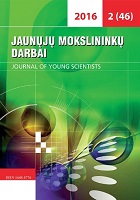IKIMOKYKLINIO AMŽIAUS VAIKŲ MOKĖJIMO MOKYTIS UGDYMO(SI) REIKŠMINGUMAS MOKYMOSI VISĄ GYVENIMĄ KONTEKSTE
THE IMPORTANCE OF (SELF)EDUCATING PRE-SCHOOL CHILDREN’S ABILITY TO LEARN IN THE CONTEXT OF LIFELONG LEARNING
Author(s): Goda StonkuvienėSubject(s): Preschool education, School education, State/Government and Education, EU-Approach / EU-Accession / EU-Development, Sociology of Education, Pedagogy
Published by: Vilniaus Universiteto Leidykla
Keywords: preschool education; ability to learn; European Union and Lithuania’s documents;
Summary/Abstract: In today’s increasingly globalized world, people need to quickly adapt to a rapidly changing environment. Change underpins constant and continuous social and personal development. A person’s attitude towards lifelong learning plays an important role and ensures the process goes smoothly. Each person should be able to learn independently, analyse and reflect experience, seek knowledge in professional activities or the areas of interest. To do that systematically and consistently a person has to master learning to learn abilities and start developing them from preschool age. In the context of lifelong learning, the importance of preschool age is emphasised in the European agenda for education as well as in Lithuania’s documents on preschool and pre-primary education. In the context of learning to learn, document analysis allows the author to state that there is almost no direct mention of preschool education in Lithuania’s national policy on education although, speaking about a need for and the ability to learn through one’s life, this stage of education is of prime importance within the importance of other stages of education. EU and Lithuania’s document analysis on education may serve as the grounds for in-depth research into children’s ability to learn at the preschool and/or pre-primary education stage at a theoretical and empirical level and the (self)education of learning to learn of higher quality.
Journal: Jaunųjų mokslininkų darbai
- Issue Year: 2016
- Issue No: 2 (46)
- Page Range: 41-49
- Page Count: 9
- Language: Lithuanian

